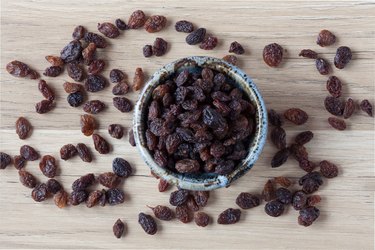
Whether in rum raisin ice cream, granola, trail mix or as a salad topper, raisins add a pop of flavor to many dishes. There are several varieties of raisins, including currants, golden seedless and sultanas. Though they look different, "black" and "white" raisins don't differ much nutritionally.
Types of Raisins
Video of the Day
According to the UC Berkeley Wellness, most raisins produced in the United States are one of seven different varieties. Almost all California raisins are made from Thompson seedless grapes, which can be used to produce both golden seedless raisins, which are yellow in color, and natural seedless raisins, which are sun dried and naturally develop a dark brown color.
Video of the Day
Black Corinth grapes are used to make small, tart currant raisins. These are seedless and one fourth the size of Thompson seedless raisins. Currants are also very dark in color and sometimes labeled "Zante currants."
Another dark grape, the Monukka grape, is used to make raisins of the same name. Monukka raisins are seedless, very large and black. They are made in limited quantities and are usually sold in health food stores, according to UC Berkeley.
Rounding out UC Berkeley's raisin variety list are Flame seedless raisins, Muscat raisins and Sultanas. Flame seedless raisins are red, large and very sweet. Muscat raisins — considered a specialty item and mostly used in baking — are large, brown and contain seeds. Last, Sultanas are tart, large, golden raisins, which can be purchased in gourmet and health food stores.
Read more: Black Grapes Vs. Red Grapes
Nutritional Value of Black Raisins
As you may have noticed, there are several different varieties of both black raisins and white or yellow raisins. Because they are quite common and do not have to be purchased in a health-food store, we chose to compare golden seedless raisins (light-colored) and natural seedless raisins (dark-colored), which are both made from Thompson seedless grapes.
One small 1.5-ounce box of natural, dark seedless raisins weighs 43 grams. According to the USDA, this serving contains:
- 129 calories
- 1.4 grams of protein
- 1.9 grams of fiber
- 0.1 grams of fat
- 28 grams of sugar
- 26.7 milligrams of calcium
- 15.5 milligrams of magnesium
- 42.1 milligrams of phosphorous
- 320 milligrams of potassium
Read more: Are Raisins Bad For a Weight Loss Diet?
Nutritional Value of Yellow Raisins
Though golden seedless raisins are also made from Thompson seedless grapes, they undergo a different drying process than dark natural seedless raisins. According to UC Davis, golden seedless raisins retain their light color due to a sulfur dioxide treatment before being oven dried. This treatment stops browning, preserves the natural flavor of the grape, and slows the loss of pro-vitamin A and ascorbic acid.
According to the USDA, a 43-gram serving of golden seedless raisins (the equivalent of one small 1.5-ounce box) contains:
- 129 calories
- 1.4 grams of protein
- 1.4 grams of fiber
- 0.1 grams of fat
- 28.3 grams of sugar
- 27.5 milligrams of calcium
- 15.1 milligrams of magnesium
- 43.4 milligrams of phosphorous
- 320.8 milligrams of potassium
When you look closely at the nutrition breakdowns of white golden seedless raisins and black natural seedless raisins, they are nearly the same, with slight variations. Natural seedless raisins have 0.5 grams more fiber per serving, while golden seedless raisins have minutely more potassium, phosphorous and calcium.
Both golden seedless raisins and natural seedless raisins are a healthy snack, as they are low in calories and fat and provide varying amounts of vitamins and minerals. Keep in mind, because both of these raisin varieties are high in sugar, you will need to decrease your serving size if you are watching your sugar intake. For those with diabetes, the University of Arkansas suggests eating only about 2 tablespoons of raisins at a time.
- UC Berkeley Wellness: "Types of Raisins: Currants, Golden Seedless, and More"
- USDA: "Raisins, Golden, Seedless"
- USDA: "Raisins, Dark, Seedless (Includes Foods for USDA's Food Distribution Program)"
- UC Davis: "The Raisin Drying Process"
- University of Arkansas: "The Exchange List System for Diabetic Meal Planning"